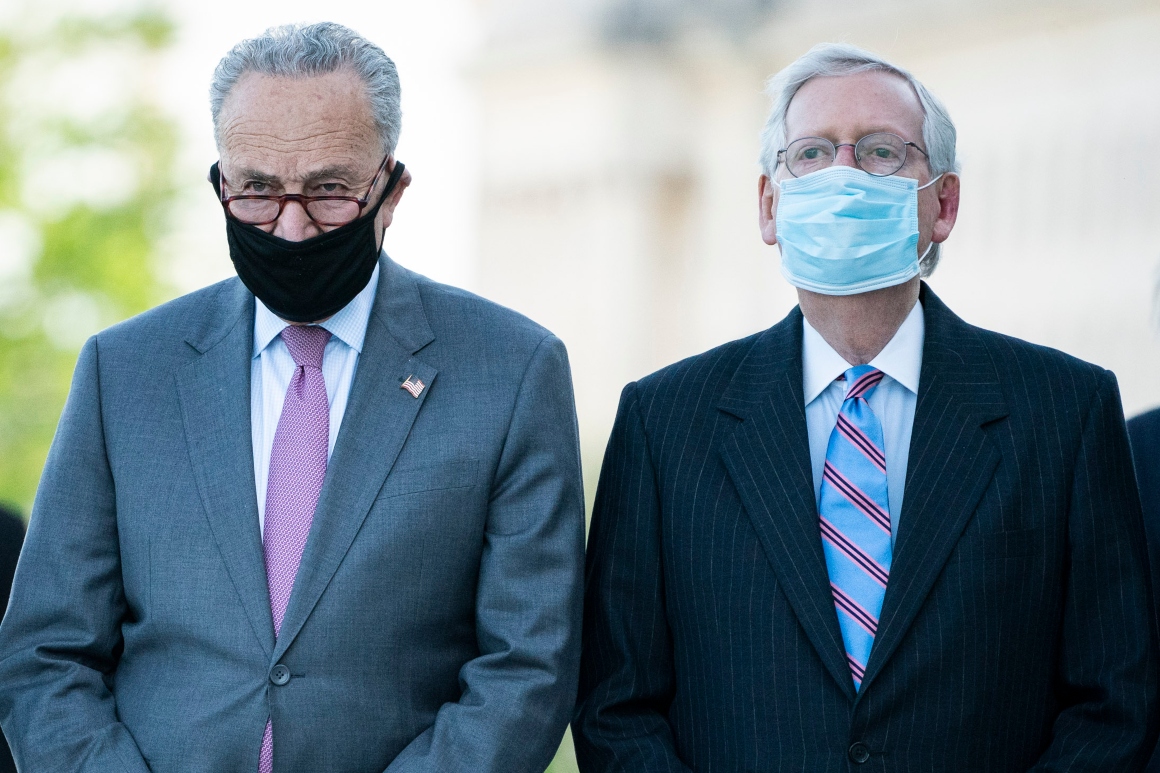Chuck Schumer and Mitch McConnell clobbered each other incessantly during October’s debt ceiling standoff. Now, as a new December deadline approaches, they’re taking a slightly more conciliatory approach.
“The best way to characterize it is we’re going to be discussing the way forward,” McConnell said in a brief interview Thursday, ahead of a meeting in Schumer’s office.
The talks between the majority and minority leaders come as the Treasury Department projects that the U.S. government can stave off a debt default until Dec. 15. While some independent estimates suggest the so-called X-date could be some time between mid-December and early February, the discussions highlight a new sense of urgency to avoid an economic crisis.
It’s also a stark contrast to the standoff earlier this fall, when Schumer and McConnell did not meet. Instead, McConnell initially spoke to moderate Sens. Joe Manchin (D-W.Va.) and Kyrsten Sinema (D-Ariz.) to discuss his proposal for a two-month extension.
While McConnell in October provided the needed 11 GOP votes to allow Democrats to suspend the debt limit for two months, the Kentucky Republican has insisted that raising the debt limit in the long-term needs to be done unilaterally by the majority party, using the so-called reconciliation process.
“I think efforts are being made to try to make it possible for Democrats to do this with a fairly uncomplicated reconciliation, stand-alone vote,” said Sen. Roy Blunt, the No. 4 GOP leader. “But I don’t know if that at the end of the day will happen … most Republicans would be happy to see Democrats pass this by themselves.”
Many Senate Democrats have long opposed using reconciliation, arguing that it would set a problematic precedent to address the debt limit along party lines and that the process would be too time consuming. Plus, they say, much of the debt was incurred under former President Donald Trump. Republicans, however, cite Biden’s forthcoming $1.75 trillion social spending bill as one major reason Democrats need to suspend the debt limit on their own.
The rhetoric between the two leaders, in recent weeks, has been more tame. When asked about the debt limit this week, McConnell said: “we’ll figure out how to avoid default, we always do.” Schumer, meanwhile, told reporters “we hope to do it in a bipartisan way.”
That’s a marked contrast from October, when Republicans hammered Schumer over his fiery floor speech shortly after the debt limit vote. He said the GOP was playing “a dangerous and risky partisan game.” The speech especially angered Republicans who had provided the votes for the short-term fix, prompting McConnell to accuse Schumer of having a “tantrum” in a subsequent letter to President Joe Biden.
“A couple weeks ago it was pretty acrimonious, but sometimes time passes,” observed Sen. Bob Casey (D-Pa.).
While Democrats are pushing for Republicans to again provide the votes to move forward on suspending the debt limit, it’s not clear that the required 10 Republicans would agree to do so again. McConnell faced criticism from former President Donald Trump and members of his own conference for helping Democrats proceed even on a short-term extension.
As the two Senate leaders hash out the next steps forward, some Senate Democrats say they are open to using the reconciliation process if Republicans refuse to put up the votes.
“I would like to do it in whichever ways we can get it done,” Sinema said in an interview this week. “The easiest and best way would be for us to get consent to do it with a simple majority. That would be great. If that doesn’t occur, then I would say we should explore the other opportunities that are afforded to us by the rules.”
The uncertainty around the debt limit comes as the Senate faces a jam-packed schedule in December. In addition to avoiding a debt default, Senate Democrats need to wrap up the annual defense policy bill, fund the government and pass Biden’s social spending bill. So far, there appears to be little interest in folding the debt limit into the social spending package.
Publicly, Democratic and Republican leaders aren’t moving from their initial positions. But leaders in both parties clearly want to avoid default.
“There are conversations underway,” said Senate Minority Whip John Thune. “I’d hate to predict with any kind of certainty what in the end might end up or might not end up happening. But as you know our view has been: Democrats have got to deliver the votes, they’re in the majority.”





















